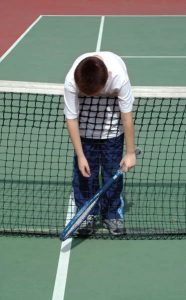“You are pathetic”, a mother screamed at her son from the sidelines of a soccer match as he missed a goal.
Competition is good for children. It enables the development of a healthy attitude towards winning and losing. It helps them to assess their own abilities, set goals, develop problem-solving skills, learn to perform in and before a group, and nurture competence in a certain area of interest.
However, parents often become fervently focussed on their child winning, every time. The competitive spirit takes on skewed proportions and the child is forgotten in the whole tussle of winning. Sometimes this competitiveness originates from a sense of insecurity in parents. They handle this stress by justifying every action as the right one, which of course means everyone else is wrong. They may, however, find themselves blatantly uninvited at play dates if this is the case.
So how do you draw a line between competitiveness and over competitiveness? It’s a tricky one.
Here are a few signs that you may be turning into an over-competitive, victory-obsessed and unpopular parent.
- Screaming instructions from the sidelines: It’s a bright sunny day for a lovely sports day.
 Your 10-year old son is the goal keeper. The kids are playing with a fair competitive spirit and you come along and start throwing instructions to your son on how to stop goals. The team coach is just gaping at you along with the other parents. Halt! Just sit back and enjoy the show and let your kid be. It’s great if he wins. If not, he will learn how to deal with losing. Isn’t that one of the goals of the game?
Your 10-year old son is the goal keeper. The kids are playing with a fair competitive spirit and you come along and start throwing instructions to your son on how to stop goals. The team coach is just gaping at you along with the other parents. Halt! Just sit back and enjoy the show and let your kid be. It’s great if he wins. If not, he will learn how to deal with losing. Isn’t that one of the goals of the game? - Your child has lost interest in the activity: This indicates that you may have crossed a line and become a perpetual kill joy. If you find yourself screaming at your child for failing, you know this is true. Your child is probably petrified and/or embarrassed of you. If he/she doesn’t want to participate in events anymore or would rather you did not attend the same, it should ring a warning bell.
- The blame game: You find yourself criticising the teacher/organiser/other kids for
 making your child lose. An over-competitive parent finds the urge to vent their frustration somewhere. Teachers and coaches are professionals and they understand your child’s ability and nature. They will push your child accordingly. Trust in them.
making your child lose. An over-competitive parent finds the urge to vent their frustration somewhere. Teachers and coaches are professionals and they understand your child’s ability and nature. They will push your child accordingly. Trust in them. - Other parents avoid you: Are you constantly asking other parents about their child’s developmental milestones and then raving about how your child has excelled beyond their ordinary average child? Secretly you feel elated when other children are lagging behind your child? If you indulge in these comparisons obsessively, you will never find satisfaction in your child’s achievements and efforts. Your child is wonderful, so is the child next door.
- You are living your dream: Often we have unattained dreams and we find ourselves living them via our children. We frequently view our children as extensions of ourselves and not as individuals with separate dreams and aptitude. But we ought to snap out of our reverie and let our children explore their passion without any shoving and pushing. Their achievements in fields they love will give you far more happiness than pressurising them to do your bidding.
 Besides, competition is not meant for all age groups. Research shows that 6-to-8-year-olds play for fun and do well in participatory and group activities. Competitive play is beyond their understanding. Nine-to-12-year-olds begin to understand competition but it is after the age of 13 that children fare well at competitive games. More importantly, you can help your child succeed in competitive play by allowing them to practise their competitive muscle in a secure environment wherein losing a game is not equivalent to losing self esteem.
Besides, competition is not meant for all age groups. Research shows that 6-to-8-year-olds play for fun and do well in participatory and group activities. Competitive play is beyond their understanding. Nine-to-12-year-olds begin to understand competition but it is after the age of 13 that children fare well at competitive games. More importantly, you can help your child succeed in competitive play by allowing them to practise their competitive muscle in a secure environment wherein losing a game is not equivalent to losing self esteem.
Like I said, competition is important but your child’s importance, you may agree, is unchallenged.







